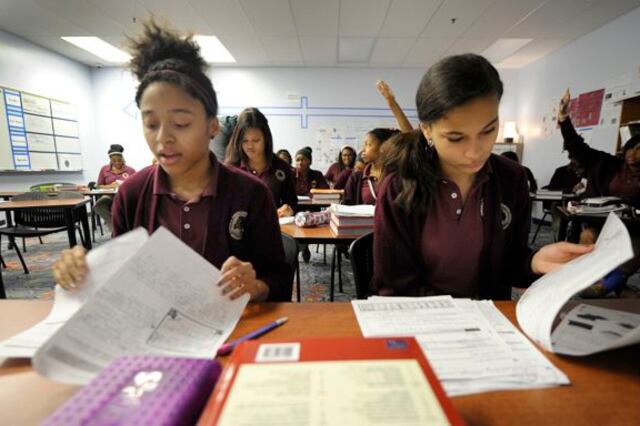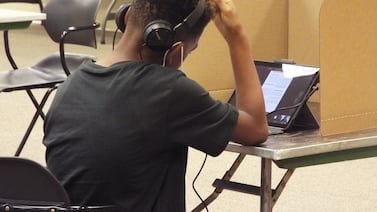When Brian Metcalf started observing math classes at Tindley charter schools, where he took the helm last year, he noticed something was often missing: Deep discussions.
Teachers focused on making sure students got the answers right, said Metcalf, who is CEO of the network. But they didn’t consistently ensure that students understood why a method worked or could explain why they chose a particular formula.
That approach to math has been used for years, and it’s probably how most teachers themselves were taught when they were students. But when Indiana changed its expectations for what students should learn six years ago, it raised the bar. State tests are now tougher, and they aim to measure whether students truly understand the material they’ve been taught.
In the years since Indiana rolled out its new guidelines for what students should learn, however, results on state tests have stagnated — raising concerns that class materials and instruction are not matching the expectations the state has set for students.
Tindley is one of three Indianapolis charter networks participating in a new, $1.5 million grant-funded pilot that seeks to test whether focused, intensive teacher training can help schools change how they teach math and improve students’ conceptual understanding.
“This isn’t just about getting math right,” Metcalf said. When students learn to think critically, it sets them up for success in college and for careers, even if they have jobs that don’t rely heavily on math, he said.
“You can put any problem in front of them and they’ll start to think about multiple ways of solving that particular problem,” said Metcalf, who compared those skills to what he learned in an analytics class when he was working on his doctorate.
The three-year pilot is funded by the Richard M. Fairbanks Foundation and managed by The Mind Trust, a nonprofit that supports charter schools. (The Fairbanks Foundation also supports Chalkbeat.)
Teacher and staff training is led by Instruction Partners, a Nashville-based nonprofit that has developed a set of skills that co-founder and CEO Emily Freitag said are crucial to strong math instruction.
During the first year, the nonprofit will spend 30 days at each school observing and coaching teachers on math instruction and 10 days working with school leaders, said Tina Seymour, senior director of school support for The Mind Trust.
Mind Trust leaders hope the project will improve instruction and teacher skills and will create a playbook other schools can follow, said Seymour.
Here’s an example Freitag of Instruction Partners offered of how conceptual teaching is different from a traditional, procedural approach: When it comes to the multiplication of double-digit numbers, such as 36 times 42, students used to learn one, standard algorithm.
Typically, they begin by multiplying two and six, move over a place value, and multiply two times three. It’s a process that works and it’s what most teachers were likely taught in school themselves, she said.
But “it turns out, they’re actually like four different ways you can multiply 36 times 42,” Freitag said. By teaching other methods, educators can help more students understand why procedures work and remember them, she said.
“If 50% of students really didn’t learn the standard algorithms successfully, and felt like ‘oh, I’m just not a math person,’ we’re losing out on their talent if we can’t find other ways to help them learn,” Freitag said.








